MN5009QA: Analyzing Power, Politics, and Conflict in Organizations
VerifiedAdded on 2023/06/11
|9
|2929
|480
Report
AI Summary
This report provides an in-depth analysis of power, politics, and conflict within organizations, using Tesco as a case study. It explores the concepts of power, including coercive, reward, legitimate, expert, informational, and referent power, relating them to leadership and organizational behavior. The report also examines organizational politics, discussing its positive and negative aspects, sources, and impact on employee performance and productivity. Furthermore, it delves into organizational conflict, its causes, types, and management using Pondy’s conflict episode process model, highlighting both positive and negative outcomes. The conclusion emphasizes the importance of managing these elements effectively to create a healthier and more competitive work environment.
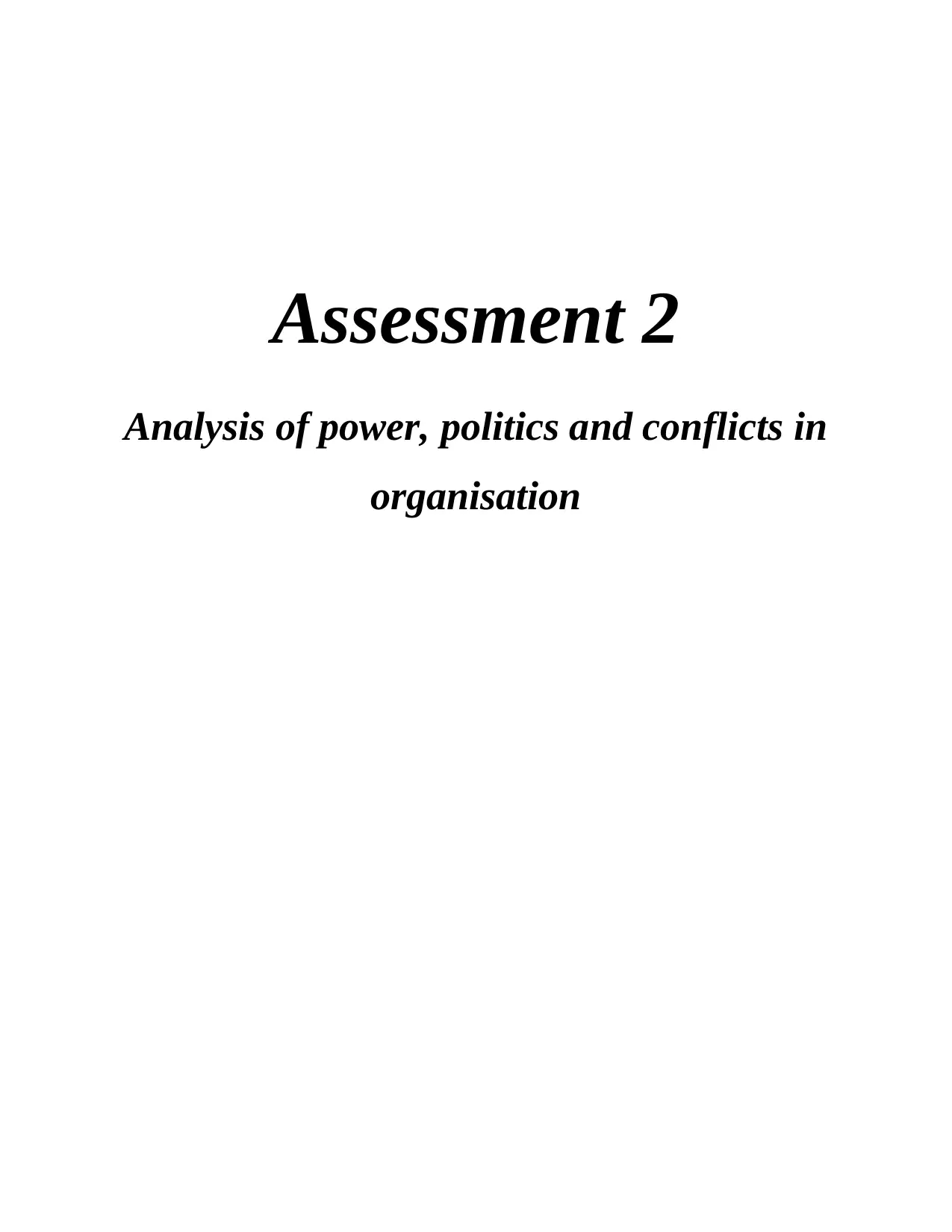
Assessment 2
Analysis of power, politics and conflicts in
organisation
Analysis of power, politics and conflicts in
organisation
Paraphrase This Document
Need a fresh take? Get an instant paraphrase of this document with our AI Paraphraser
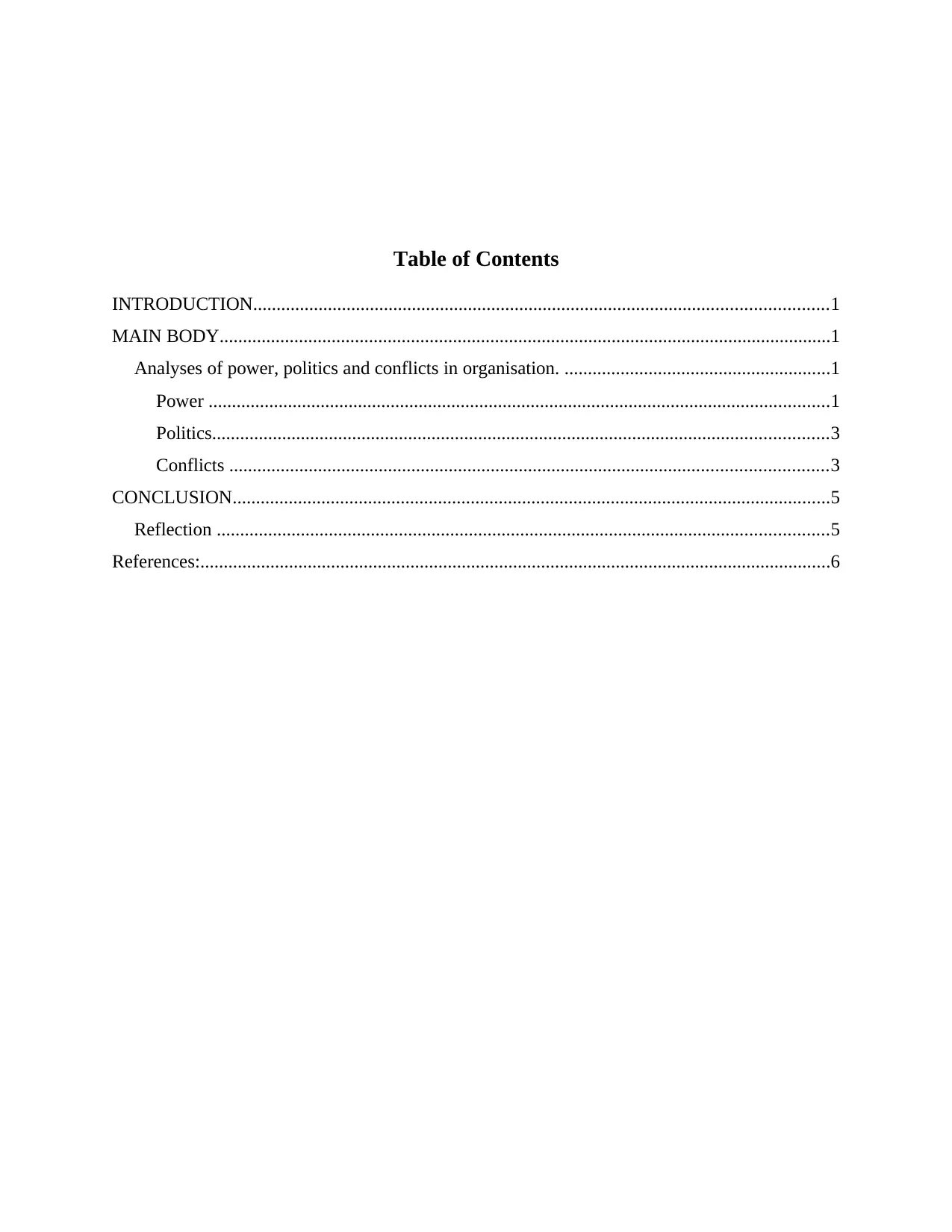
Table of Contents
INTRODUCTION...........................................................................................................................1
MAIN BODY...................................................................................................................................1
Analyses of power, politics and conflicts in organisation. .........................................................1
Power .....................................................................................................................................1
Politics....................................................................................................................................3
Conflicts ................................................................................................................................3
CONCLUSION................................................................................................................................5
Reflection ...................................................................................................................................5
References:.......................................................................................................................................6
INTRODUCTION...........................................................................................................................1
MAIN BODY...................................................................................................................................1
Analyses of power, politics and conflicts in organisation. .........................................................1
Power .....................................................................................................................................1
Politics....................................................................................................................................3
Conflicts ................................................................................................................................3
CONCLUSION................................................................................................................................5
Reflection ...................................................................................................................................5
References:.......................................................................................................................................6
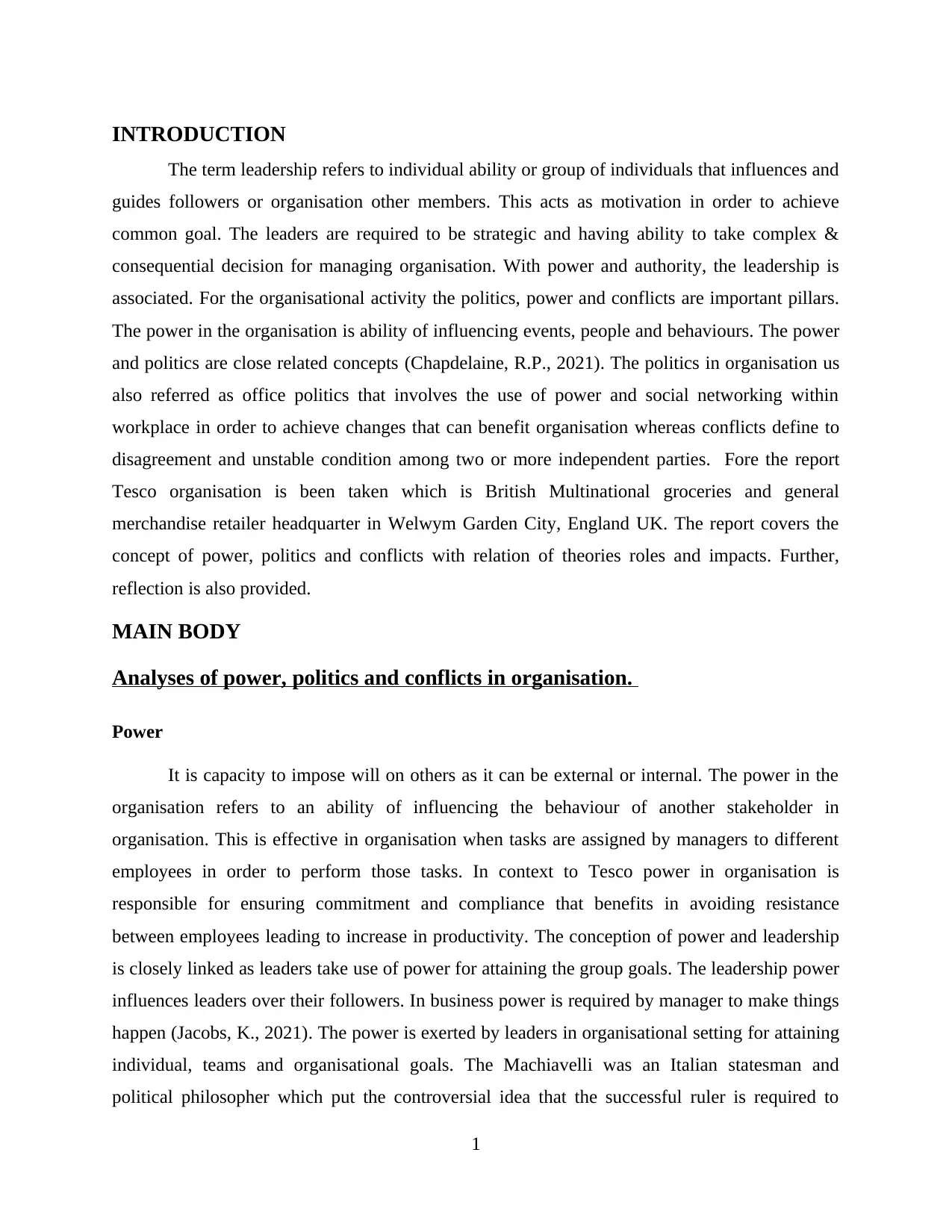
INTRODUCTION
The term leadership refers to individual ability or group of individuals that influences and
guides followers or organisation other members. This acts as motivation in order to achieve
common goal. The leaders are required to be strategic and having ability to take complex &
consequential decision for managing organisation. With power and authority, the leadership is
associated. For the organisational activity the politics, power and conflicts are important pillars.
The power in the organisation is ability of influencing events, people and behaviours. The power
and politics are close related concepts (Chapdelaine, R.P., 2021). The politics in organisation us
also referred as office politics that involves the use of power and social networking within
workplace in order to achieve changes that can benefit organisation whereas conflicts define to
disagreement and unstable condition among two or more independent parties. Fore the report
Tesco organisation is been taken which is British Multinational groceries and general
merchandise retailer headquarter in Welwym Garden City, England UK. The report covers the
concept of power, politics and conflicts with relation of theories roles and impacts. Further,
reflection is also provided.
MAIN BODY
Analyses of power, politics and conflicts in organisation.
Power
It is capacity to impose will on others as it can be external or internal. The power in the
organisation refers to an ability of influencing the behaviour of another stakeholder in
organisation. This is effective in organisation when tasks are assigned by managers to different
employees in order to perform those tasks. In context to Tesco power in organisation is
responsible for ensuring commitment and compliance that benefits in avoiding resistance
between employees leading to increase in productivity. The conception of power and leadership
is closely linked as leaders take use of power for attaining the group goals. The leadership power
influences leaders over their followers. In business power is required by manager to make things
happen (Jacobs, K., 2021). The power is exerted by leaders in organisational setting for attaining
individual, teams and organisational goals. The Machiavelli was an Italian statesman and
political philosopher which put the controversial idea that the successful ruler is required to
1
The term leadership refers to individual ability or group of individuals that influences and
guides followers or organisation other members. This acts as motivation in order to achieve
common goal. The leaders are required to be strategic and having ability to take complex &
consequential decision for managing organisation. With power and authority, the leadership is
associated. For the organisational activity the politics, power and conflicts are important pillars.
The power in the organisation is ability of influencing events, people and behaviours. The power
and politics are close related concepts (Chapdelaine, R.P., 2021). The politics in organisation us
also referred as office politics that involves the use of power and social networking within
workplace in order to achieve changes that can benefit organisation whereas conflicts define to
disagreement and unstable condition among two or more independent parties. Fore the report
Tesco organisation is been taken which is British Multinational groceries and general
merchandise retailer headquarter in Welwym Garden City, England UK. The report covers the
concept of power, politics and conflicts with relation of theories roles and impacts. Further,
reflection is also provided.
MAIN BODY
Analyses of power, politics and conflicts in organisation.
Power
It is capacity to impose will on others as it can be external or internal. The power in the
organisation refers to an ability of influencing the behaviour of another stakeholder in
organisation. This is effective in organisation when tasks are assigned by managers to different
employees in order to perform those tasks. In context to Tesco power in organisation is
responsible for ensuring commitment and compliance that benefits in avoiding resistance
between employees leading to increase in productivity. The conception of power and leadership
is closely linked as leaders take use of power for attaining the group goals. The leadership power
influences leaders over their followers. In business power is required by manager to make things
happen (Jacobs, K., 2021). The power is exerted by leaders in organisational setting for attaining
individual, teams and organisational goals. The Machiavelli was an Italian statesman and
political philosopher which put the controversial idea that the successful ruler is required to
1
⊘ This is a preview!⊘
Do you want full access?
Subscribe today to unlock all pages.

Trusted by 1+ million students worldwide
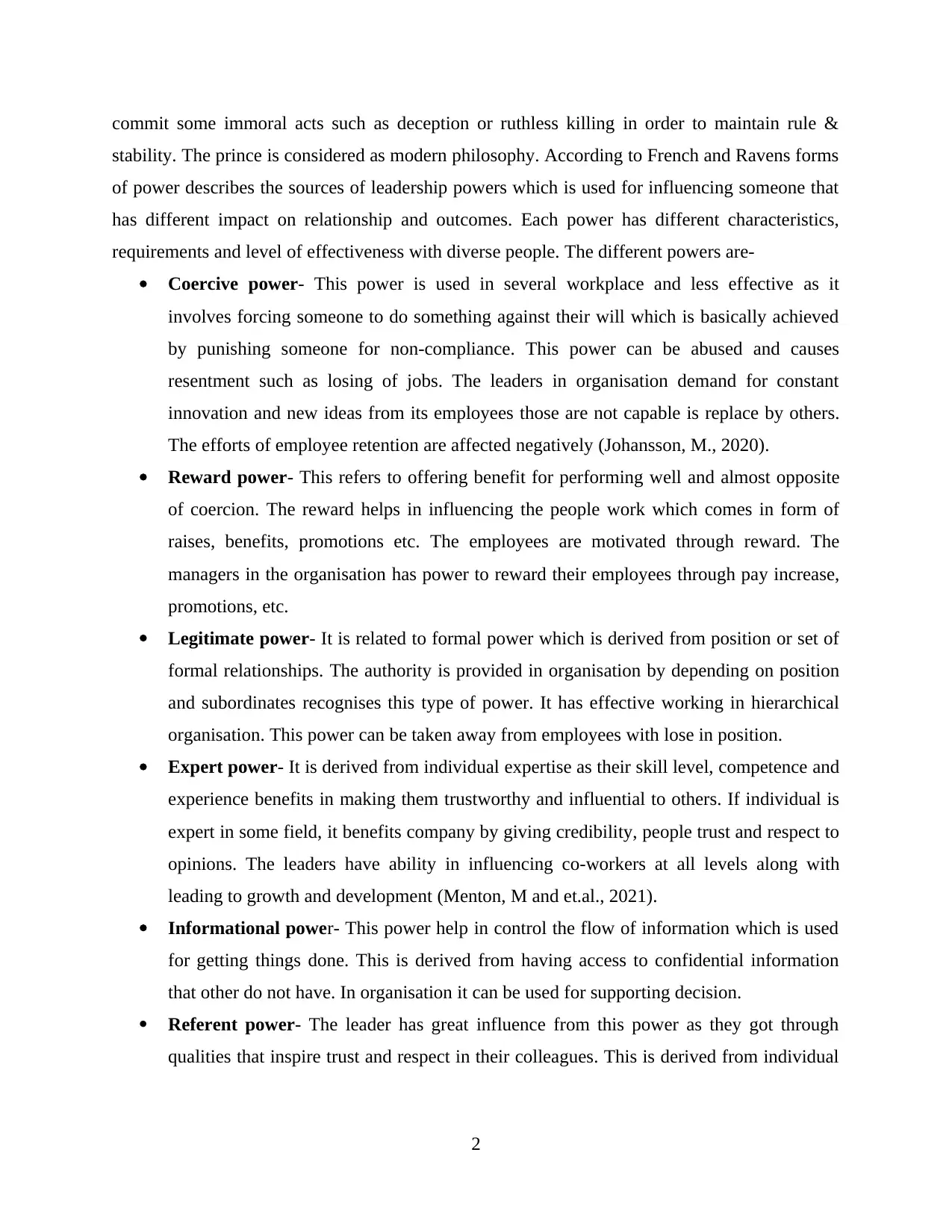
commit some immoral acts such as deception or ruthless killing in order to maintain rule &
stability. The prince is considered as modern philosophy. According to French and Ravens forms
of power describes the sources of leadership powers which is used for influencing someone that
has different impact on relationship and outcomes. Each power has different characteristics,
requirements and level of effectiveness with diverse people. The different powers are-
Coercive power- This power is used in several workplace and less effective as it
involves forcing someone to do something against their will which is basically achieved
by punishing someone for non-compliance. This power can be abused and causes
resentment such as losing of jobs. The leaders in organisation demand for constant
innovation and new ideas from its employees those are not capable is replace by others.
The efforts of employee retention are affected negatively (Johansson, M., 2020).
Reward power- This refers to offering benefit for performing well and almost opposite
of coercion. The reward helps in influencing the people work which comes in form of
raises, benefits, promotions etc. The employees are motivated through reward. The
managers in the organisation has power to reward their employees through pay increase,
promotions, etc.
Legitimate power- It is related to formal power which is derived from position or set of
formal relationships. The authority is provided in organisation by depending on position
and subordinates recognises this type of power. It has effective working in hierarchical
organisation. This power can be taken away from employees with lose in position.
Expert power- It is derived from individual expertise as their skill level, competence and
experience benefits in making them trustworthy and influential to others. If individual is
expert in some field, it benefits company by giving credibility, people trust and respect to
opinions. The leaders have ability in influencing co-workers at all levels along with
leading to growth and development (Menton, M and et.al., 2021).
Informational power- This power help in control the flow of information which is used
for getting things done. This is derived from having access to confidential information
that other do not have. In organisation it can be used for supporting decision.
Referent power- The leader has great influence from this power as they got through
qualities that inspire trust and respect in their colleagues. This is derived from individual
2
stability. The prince is considered as modern philosophy. According to French and Ravens forms
of power describes the sources of leadership powers which is used for influencing someone that
has different impact on relationship and outcomes. Each power has different characteristics,
requirements and level of effectiveness with diverse people. The different powers are-
Coercive power- This power is used in several workplace and less effective as it
involves forcing someone to do something against their will which is basically achieved
by punishing someone for non-compliance. This power can be abused and causes
resentment such as losing of jobs. The leaders in organisation demand for constant
innovation and new ideas from its employees those are not capable is replace by others.
The efforts of employee retention are affected negatively (Johansson, M., 2020).
Reward power- This refers to offering benefit for performing well and almost opposite
of coercion. The reward helps in influencing the people work which comes in form of
raises, benefits, promotions etc. The employees are motivated through reward. The
managers in the organisation has power to reward their employees through pay increase,
promotions, etc.
Legitimate power- It is related to formal power which is derived from position or set of
formal relationships. The authority is provided in organisation by depending on position
and subordinates recognises this type of power. It has effective working in hierarchical
organisation. This power can be taken away from employees with lose in position.
Expert power- It is derived from individual expertise as their skill level, competence and
experience benefits in making them trustworthy and influential to others. If individual is
expert in some field, it benefits company by giving credibility, people trust and respect to
opinions. The leaders have ability in influencing co-workers at all levels along with
leading to growth and development (Menton, M and et.al., 2021).
Informational power- This power help in control the flow of information which is used
for getting things done. This is derived from having access to confidential information
that other do not have. In organisation it can be used for supporting decision.
Referent power- The leader has great influence from this power as they got through
qualities that inspire trust and respect in their colleagues. This is derived from individual
2
Paraphrase This Document
Need a fresh take? Get an instant paraphrase of this document with our AI Paraphraser
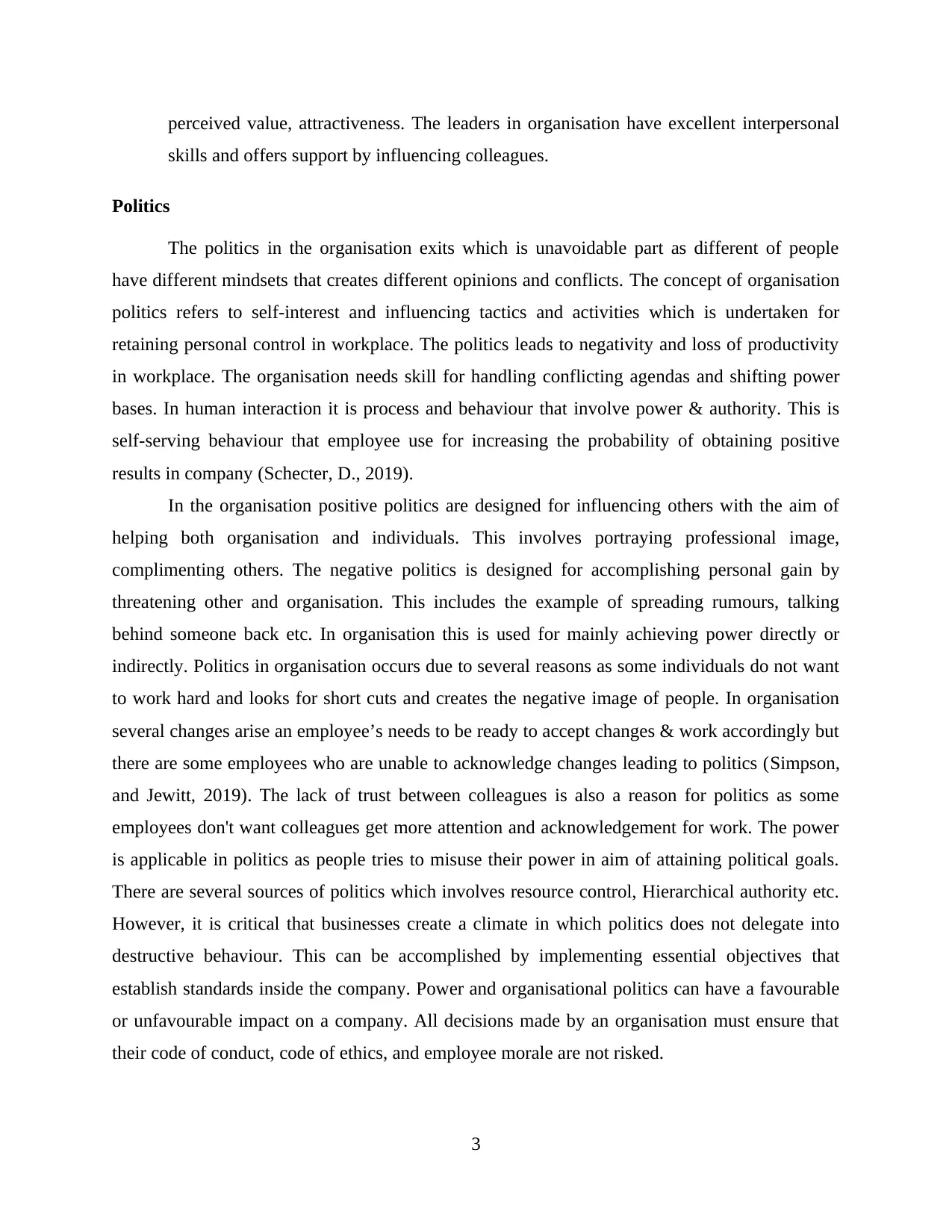
perceived value, attractiveness. The leaders in organisation have excellent interpersonal
skills and offers support by influencing colleagues.
Politics
The politics in the organisation exits which is unavoidable part as different of people
have different mindsets that creates different opinions and conflicts. The concept of organisation
politics refers to self-interest and influencing tactics and activities which is undertaken for
retaining personal control in workplace. The politics leads to negativity and loss of productivity
in workplace. The organisation needs skill for handling conflicting agendas and shifting power
bases. In human interaction it is process and behaviour that involve power & authority. This is
self-serving behaviour that employee use for increasing the probability of obtaining positive
results in company (Schecter, D., 2019).
In the organisation positive politics are designed for influencing others with the aim of
helping both organisation and individuals. This involves portraying professional image,
complimenting others. The negative politics is designed for accomplishing personal gain by
threatening other and organisation. This includes the example of spreading rumours, talking
behind someone back etc. In organisation this is used for mainly achieving power directly or
indirectly. Politics in organisation occurs due to several reasons as some individuals do not want
to work hard and looks for short cuts and creates the negative image of people. In organisation
several changes arise an employee’s needs to be ready to accept changes & work accordingly but
there are some employees who are unable to acknowledge changes leading to politics (Simpson,
and Jewitt, 2019). The lack of trust between colleagues is also a reason for politics as some
employees don't want colleagues get more attention and acknowledgement for work. The power
is applicable in politics as people tries to misuse their power in aim of attaining political goals.
There are several sources of politics which involves resource control, Hierarchical authority etc.
However, it is critical that businesses create a climate in which politics does not delegate into
destructive behaviour. This can be accomplished by implementing essential objectives that
establish standards inside the company. Power and organisational politics can have a favourable
or unfavourable impact on a company. All decisions made by an organisation must ensure that
their code of conduct, code of ethics, and employee morale are not risked.
3
skills and offers support by influencing colleagues.
Politics
The politics in the organisation exits which is unavoidable part as different of people
have different mindsets that creates different opinions and conflicts. The concept of organisation
politics refers to self-interest and influencing tactics and activities which is undertaken for
retaining personal control in workplace. The politics leads to negativity and loss of productivity
in workplace. The organisation needs skill for handling conflicting agendas and shifting power
bases. In human interaction it is process and behaviour that involve power & authority. This is
self-serving behaviour that employee use for increasing the probability of obtaining positive
results in company (Schecter, D., 2019).
In the organisation positive politics are designed for influencing others with the aim of
helping both organisation and individuals. This involves portraying professional image,
complimenting others. The negative politics is designed for accomplishing personal gain by
threatening other and organisation. This includes the example of spreading rumours, talking
behind someone back etc. In organisation this is used for mainly achieving power directly or
indirectly. Politics in organisation occurs due to several reasons as some individuals do not want
to work hard and looks for short cuts and creates the negative image of people. In organisation
several changes arise an employee’s needs to be ready to accept changes & work accordingly but
there are some employees who are unable to acknowledge changes leading to politics (Simpson,
and Jewitt, 2019). The lack of trust between colleagues is also a reason for politics as some
employees don't want colleagues get more attention and acknowledgement for work. The power
is applicable in politics as people tries to misuse their power in aim of attaining political goals.
There are several sources of politics which involves resource control, Hierarchical authority etc.
However, it is critical that businesses create a climate in which politics does not delegate into
destructive behaviour. This can be accomplished by implementing essential objectives that
establish standards inside the company. Power and organisational politics can have a favourable
or unfavourable impact on a company. All decisions made by an organisation must ensure that
their code of conduct, code of ethics, and employee morale are not risked.
3
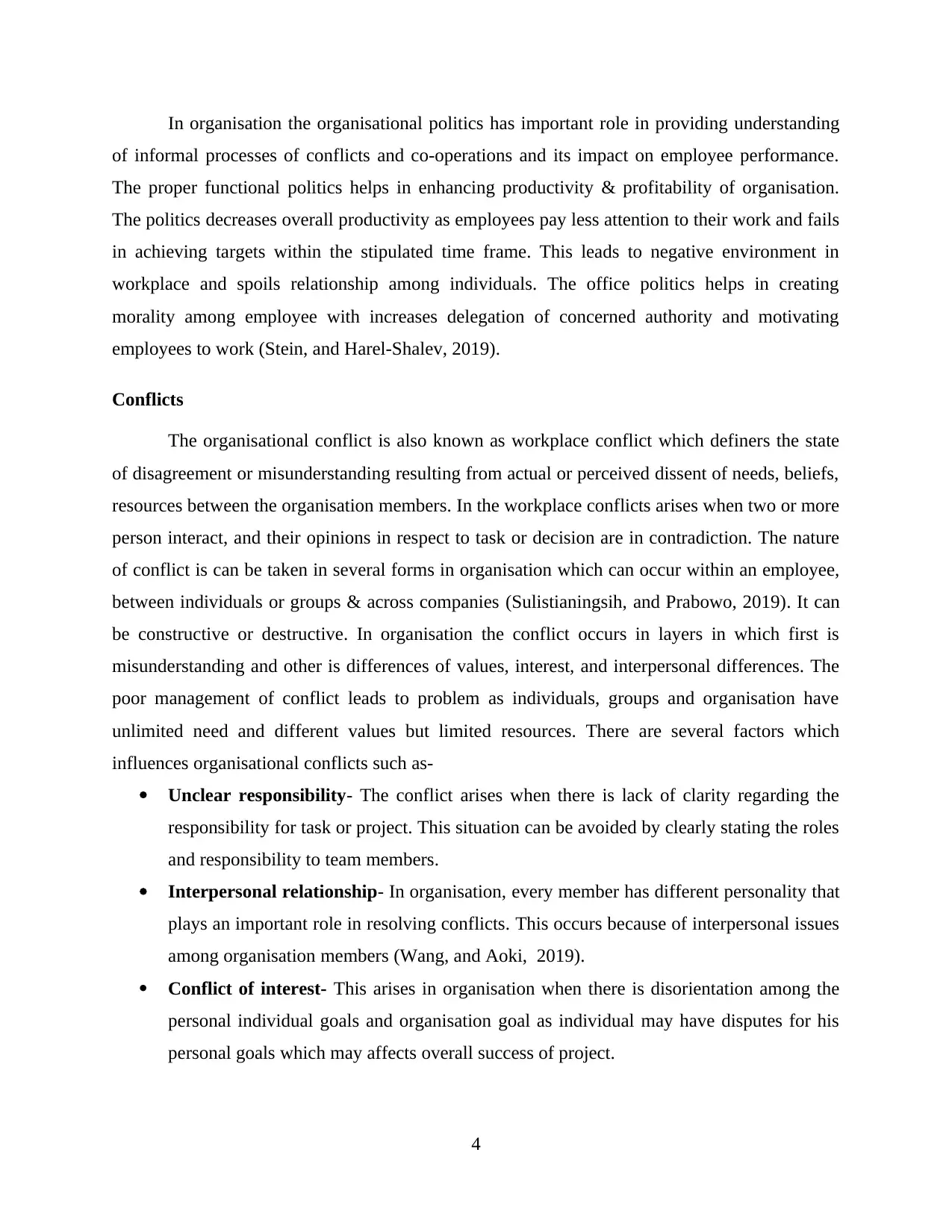
In organisation the organisational politics has important role in providing understanding
of informal processes of conflicts and co-operations and its impact on employee performance.
The proper functional politics helps in enhancing productivity & profitability of organisation.
The politics decreases overall productivity as employees pay less attention to their work and fails
in achieving targets within the stipulated time frame. This leads to negative environment in
workplace and spoils relationship among individuals. The office politics helps in creating
morality among employee with increases delegation of concerned authority and motivating
employees to work (Stein, and Harel-Shalev, 2019).
Conflicts
The organisational conflict is also known as workplace conflict which definers the state
of disagreement or misunderstanding resulting from actual or perceived dissent of needs, beliefs,
resources between the organisation members. In the workplace conflicts arises when two or more
person interact, and their opinions in respect to task or decision are in contradiction. The nature
of conflict is can be taken in several forms in organisation which can occur within an employee,
between individuals or groups & across companies (Sulistianingsih, and Prabowo, 2019). It can
be constructive or destructive. In organisation the conflict occurs in layers in which first is
misunderstanding and other is differences of values, interest, and interpersonal differences. The
poor management of conflict leads to problem as individuals, groups and organisation have
unlimited need and different values but limited resources. There are several factors which
influences organisational conflicts such as-
Unclear responsibility- The conflict arises when there is lack of clarity regarding the
responsibility for task or project. This situation can be avoided by clearly stating the roles
and responsibility to team members.
Interpersonal relationship- In organisation, every member has different personality that
plays an important role in resolving conflicts. This occurs because of interpersonal issues
among organisation members (Wang, and Aoki, 2019).
Conflict of interest- This arises in organisation when there is disorientation among the
personal individual goals and organisation goal as individual may have disputes for his
personal goals which may affects overall success of project.
4
of informal processes of conflicts and co-operations and its impact on employee performance.
The proper functional politics helps in enhancing productivity & profitability of organisation.
The politics decreases overall productivity as employees pay less attention to their work and fails
in achieving targets within the stipulated time frame. This leads to negative environment in
workplace and spoils relationship among individuals. The office politics helps in creating
morality among employee with increases delegation of concerned authority and motivating
employees to work (Stein, and Harel-Shalev, 2019).
Conflicts
The organisational conflict is also known as workplace conflict which definers the state
of disagreement or misunderstanding resulting from actual or perceived dissent of needs, beliefs,
resources between the organisation members. In the workplace conflicts arises when two or more
person interact, and their opinions in respect to task or decision are in contradiction. The nature
of conflict is can be taken in several forms in organisation which can occur within an employee,
between individuals or groups & across companies (Sulistianingsih, and Prabowo, 2019). It can
be constructive or destructive. In organisation the conflict occurs in layers in which first is
misunderstanding and other is differences of values, interest, and interpersonal differences. The
poor management of conflict leads to problem as individuals, groups and organisation have
unlimited need and different values but limited resources. There are several factors which
influences organisational conflicts such as-
Unclear responsibility- The conflict arises when there is lack of clarity regarding the
responsibility for task or project. This situation can be avoided by clearly stating the roles
and responsibility to team members.
Interpersonal relationship- In organisation, every member has different personality that
plays an important role in resolving conflicts. This occurs because of interpersonal issues
among organisation members (Wang, and Aoki, 2019).
Conflict of interest- This arises in organisation when there is disorientation among the
personal individual goals and organisation goal as individual may have disputes for his
personal goals which may affects overall success of project.
4
⊘ This is a preview!⊘
Do you want full access?
Subscribe today to unlock all pages.

Trusted by 1+ million students worldwide
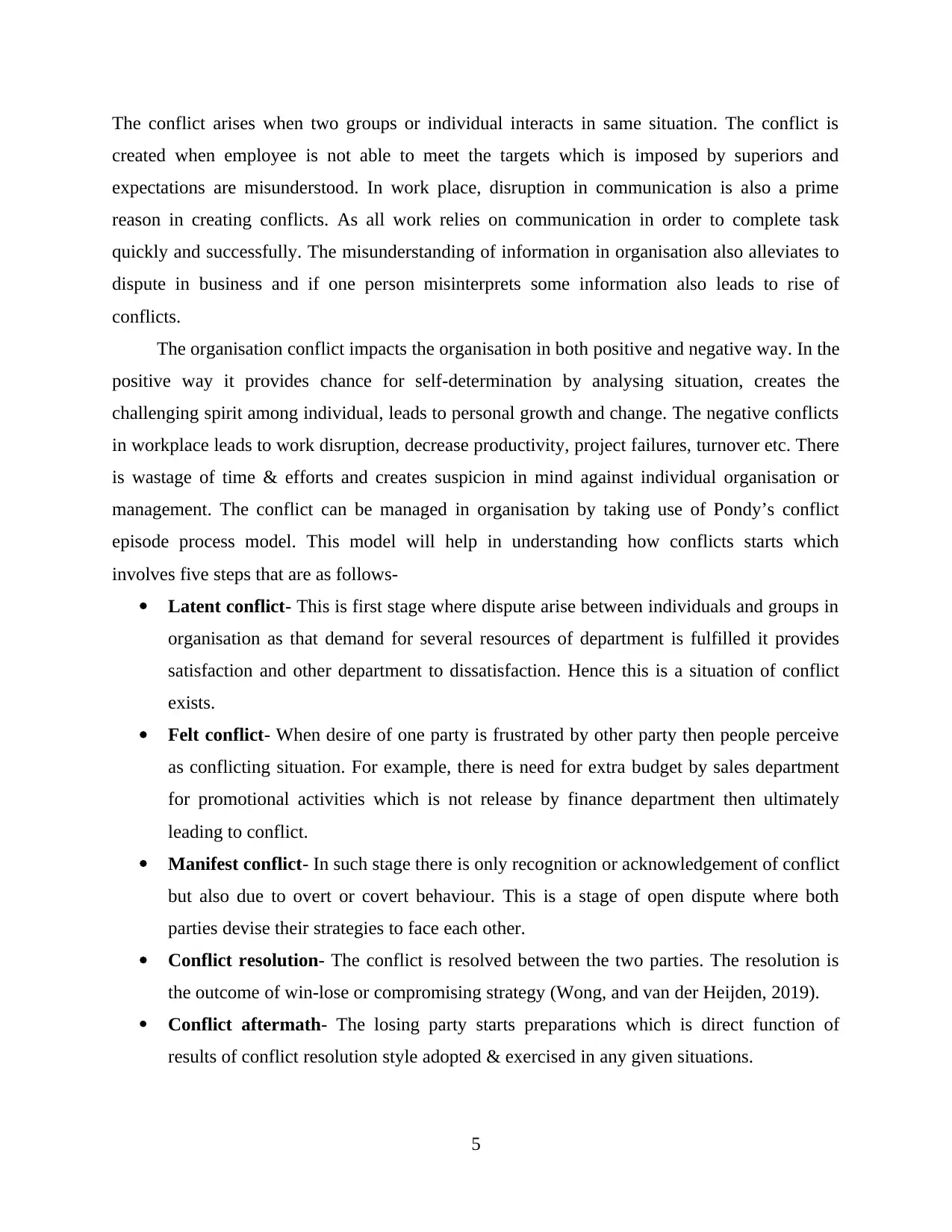
The conflict arises when two groups or individual interacts in same situation. The conflict is
created when employee is not able to meet the targets which is imposed by superiors and
expectations are misunderstood. In work place, disruption in communication is also a prime
reason in creating conflicts. As all work relies on communication in order to complete task
quickly and successfully. The misunderstanding of information in organisation also alleviates to
dispute in business and if one person misinterprets some information also leads to rise of
conflicts.
The organisation conflict impacts the organisation in both positive and negative way. In the
positive way it provides chance for self-determination by analysing situation, creates the
challenging spirit among individual, leads to personal growth and change. The negative conflicts
in workplace leads to work disruption, decrease productivity, project failures, turnover etc. There
is wastage of time & efforts and creates suspicion in mind against individual organisation or
management. The conflict can be managed in organisation by taking use of Pondy’s conflict
episode process model. This model will help in understanding how conflicts starts which
involves five steps that are as follows-
Latent conflict- This is first stage where dispute arise between individuals and groups in
organisation as that demand for several resources of department is fulfilled it provides
satisfaction and other department to dissatisfaction. Hence this is a situation of conflict
exists.
Felt conflict- When desire of one party is frustrated by other party then people perceive
as conflicting situation. For example, there is need for extra budget by sales department
for promotional activities which is not release by finance department then ultimately
leading to conflict.
Manifest conflict- In such stage there is only recognition or acknowledgement of conflict
but also due to overt or covert behaviour. This is a stage of open dispute where both
parties devise their strategies to face each other.
Conflict resolution- The conflict is resolved between the two parties. The resolution is
the outcome of win-lose or compromising strategy (Wong, and van der Heijden, 2019).
Conflict aftermath- The losing party starts preparations which is direct function of
results of conflict resolution style adopted & exercised in any given situations.
5
created when employee is not able to meet the targets which is imposed by superiors and
expectations are misunderstood. In work place, disruption in communication is also a prime
reason in creating conflicts. As all work relies on communication in order to complete task
quickly and successfully. The misunderstanding of information in organisation also alleviates to
dispute in business and if one person misinterprets some information also leads to rise of
conflicts.
The organisation conflict impacts the organisation in both positive and negative way. In the
positive way it provides chance for self-determination by analysing situation, creates the
challenging spirit among individual, leads to personal growth and change. The negative conflicts
in workplace leads to work disruption, decrease productivity, project failures, turnover etc. There
is wastage of time & efforts and creates suspicion in mind against individual organisation or
management. The conflict can be managed in organisation by taking use of Pondy’s conflict
episode process model. This model will help in understanding how conflicts starts which
involves five steps that are as follows-
Latent conflict- This is first stage where dispute arise between individuals and groups in
organisation as that demand for several resources of department is fulfilled it provides
satisfaction and other department to dissatisfaction. Hence this is a situation of conflict
exists.
Felt conflict- When desire of one party is frustrated by other party then people perceive
as conflicting situation. For example, there is need for extra budget by sales department
for promotional activities which is not release by finance department then ultimately
leading to conflict.
Manifest conflict- In such stage there is only recognition or acknowledgement of conflict
but also due to overt or covert behaviour. This is a stage of open dispute where both
parties devise their strategies to face each other.
Conflict resolution- The conflict is resolved between the two parties. The resolution is
the outcome of win-lose or compromising strategy (Wong, and van der Heijden, 2019).
Conflict aftermath- The losing party starts preparations which is direct function of
results of conflict resolution style adopted & exercised in any given situations.
5
Paraphrase This Document
Need a fresh take? Get an instant paraphrase of this document with our AI Paraphraser
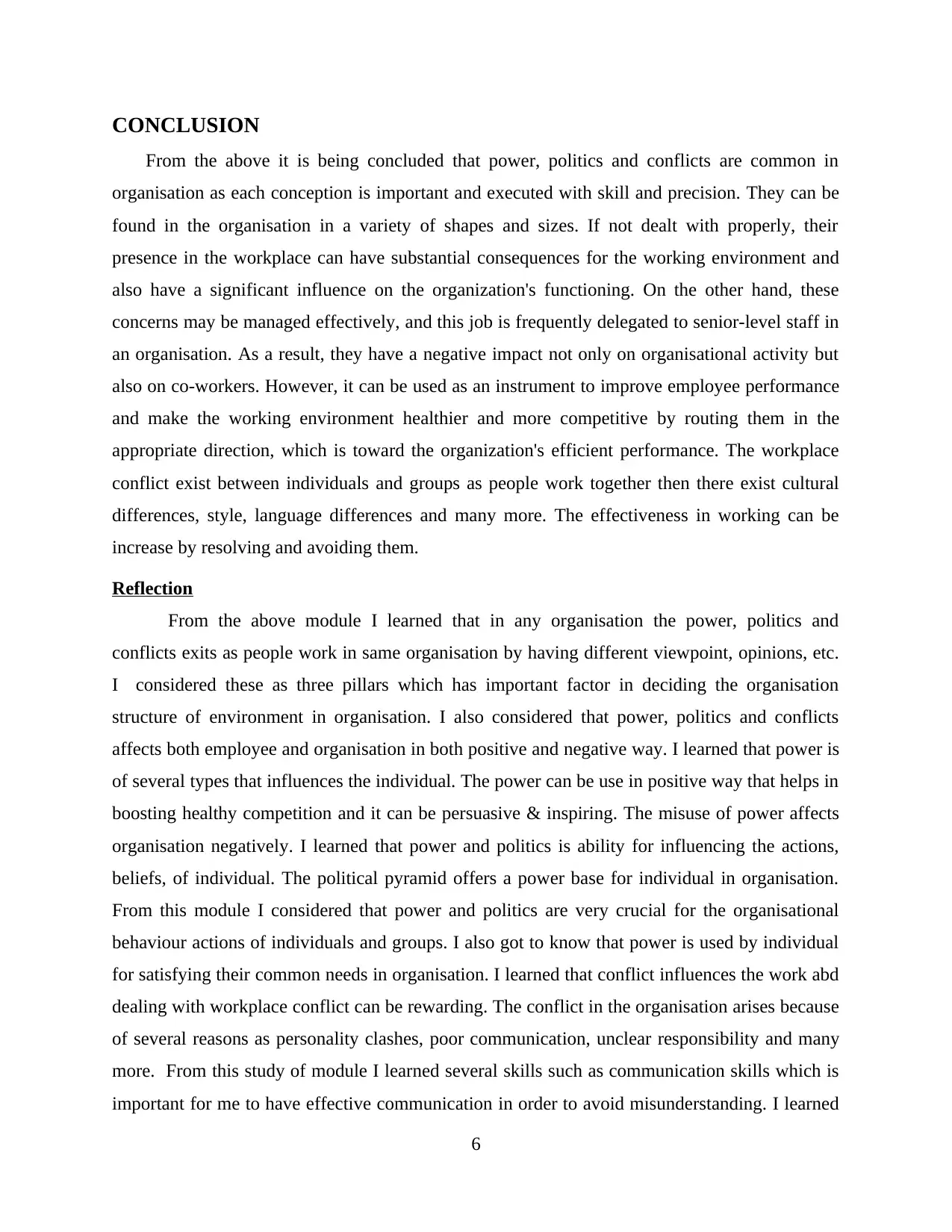
CONCLUSION
From the above it is being concluded that power, politics and conflicts are common in
organisation as each conception is important and executed with skill and precision. They can be
found in the organisation in a variety of shapes and sizes. If not dealt with properly, their
presence in the workplace can have substantial consequences for the working environment and
also have a significant influence on the organization's functioning. On the other hand, these
concerns may be managed effectively, and this job is frequently delegated to senior-level staff in
an organisation. As a result, they have a negative impact not only on organisational activity but
also on co-workers. However, it can be used as an instrument to improve employee performance
and make the working environment healthier and more competitive by routing them in the
appropriate direction, which is toward the organization's efficient performance. The workplace
conflict exist between individuals and groups as people work together then there exist cultural
differences, style, language differences and many more. The effectiveness in working can be
increase by resolving and avoiding them.
Reflection
From the above module I learned that in any organisation the power, politics and
conflicts exits as people work in same organisation by having different viewpoint, opinions, etc.
I considered these as three pillars which has important factor in deciding the organisation
structure of environment in organisation. I also considered that power, politics and conflicts
affects both employee and organisation in both positive and negative way. I learned that power is
of several types that influences the individual. The power can be use in positive way that helps in
boosting healthy competition and it can be persuasive & inspiring. The misuse of power affects
organisation negatively. I learned that power and politics is ability for influencing the actions,
beliefs, of individual. The political pyramid offers a power base for individual in organisation.
From this module I considered that power and politics are very crucial for the organisational
behaviour actions of individuals and groups. I also got to know that power is used by individual
for satisfying their common needs in organisation. I learned that conflict influences the work abd
dealing with workplace conflict can be rewarding. The conflict in the organisation arises because
of several reasons as personality clashes, poor communication, unclear responsibility and many
more. From this study of module I learned several skills such as communication skills which is
important for me to have effective communication in order to avoid misunderstanding. I learned
6
From the above it is being concluded that power, politics and conflicts are common in
organisation as each conception is important and executed with skill and precision. They can be
found in the organisation in a variety of shapes and sizes. If not dealt with properly, their
presence in the workplace can have substantial consequences for the working environment and
also have a significant influence on the organization's functioning. On the other hand, these
concerns may be managed effectively, and this job is frequently delegated to senior-level staff in
an organisation. As a result, they have a negative impact not only on organisational activity but
also on co-workers. However, it can be used as an instrument to improve employee performance
and make the working environment healthier and more competitive by routing them in the
appropriate direction, which is toward the organization's efficient performance. The workplace
conflict exist between individuals and groups as people work together then there exist cultural
differences, style, language differences and many more. The effectiveness in working can be
increase by resolving and avoiding them.
Reflection
From the above module I learned that in any organisation the power, politics and
conflicts exits as people work in same organisation by having different viewpoint, opinions, etc.
I considered these as three pillars which has important factor in deciding the organisation
structure of environment in organisation. I also considered that power, politics and conflicts
affects both employee and organisation in both positive and negative way. I learned that power is
of several types that influences the individual. The power can be use in positive way that helps in
boosting healthy competition and it can be persuasive & inspiring. The misuse of power affects
organisation negatively. I learned that power and politics is ability for influencing the actions,
beliefs, of individual. The political pyramid offers a power base for individual in organisation.
From this module I considered that power and politics are very crucial for the organisational
behaviour actions of individuals and groups. I also got to know that power is used by individual
for satisfying their common needs in organisation. I learned that conflict influences the work abd
dealing with workplace conflict can be rewarding. The conflict in the organisation arises because
of several reasons as personality clashes, poor communication, unclear responsibility and many
more. From this study of module I learned several skills such as communication skills which is
important for me to have effective communication in order to avoid misunderstanding. I learned
6
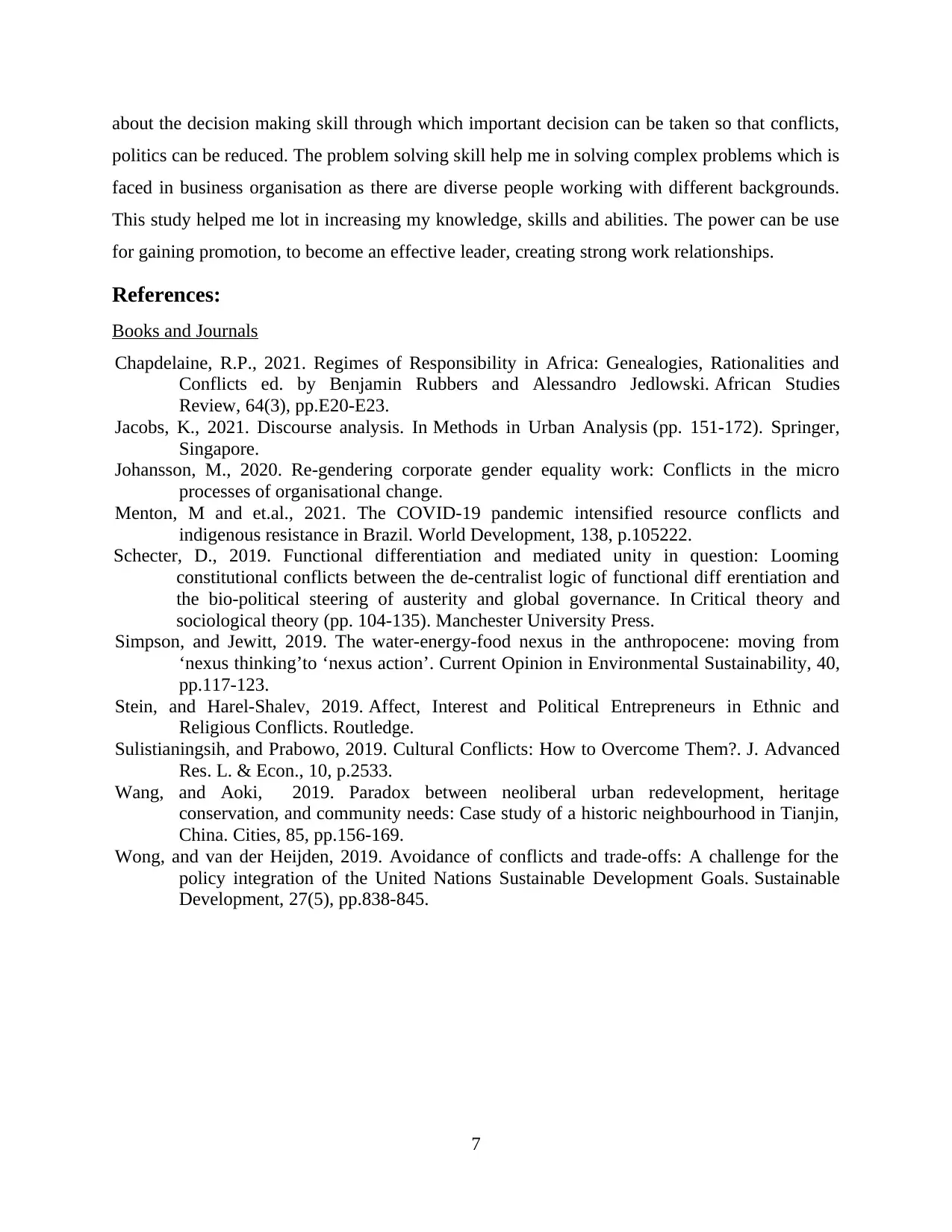
about the decision making skill through which important decision can be taken so that conflicts,
politics can be reduced. The problem solving skill help me in solving complex problems which is
faced in business organisation as there are diverse people working with different backgrounds.
This study helped me lot in increasing my knowledge, skills and abilities. The power can be use
for gaining promotion, to become an effective leader, creating strong work relationships.
References:
Books and Journals
Chapdelaine, R.P., 2021. Regimes of Responsibility in Africa: Genealogies, Rationalities and
Conflicts ed. by Benjamin Rubbers and Alessandro Jedlowski. African Studies
Review, 64(3), pp.E20-E23.
Jacobs, K., 2021. Discourse analysis. In Methods in Urban Analysis (pp. 151-172). Springer,
Singapore.
Johansson, M., 2020. Re-gendering corporate gender equality work: Conflicts in the micro
processes of organisational change.
Menton, M and et.al., 2021. The COVID-19 pandemic intensified resource conflicts and
indigenous resistance in Brazil. World Development, 138, p.105222.
Schecter, D., 2019. Functional differentiation and mediated unity in question: Looming
constitutional conflicts between the de-centralist logic of functional diff erentiation and
the bio-political steering of austerity and global governance. In Critical theory and
sociological theory (pp. 104-135). Manchester University Press.
Simpson, and Jewitt, 2019. The water-energy-food nexus in the anthropocene: moving from
‘nexus thinking’to ‘nexus action’. Current Opinion in Environmental Sustainability, 40,
pp.117-123.
Stein, and Harel-Shalev, 2019. Affect, Interest and Political Entrepreneurs in Ethnic and
Religious Conflicts. Routledge.
Sulistianingsih, and Prabowo, 2019. Cultural Conflicts: How to Overcome Them?. J. Advanced
Res. L. & Econ., 10, p.2533.
Wang, and Aoki, 2019. Paradox between neoliberal urban redevelopment, heritage
conservation, and community needs: Case study of a historic neighbourhood in Tianjin,
China. Cities, 85, pp.156-169.
Wong, and van der Heijden, 2019. Avoidance of conflicts and trade‐offs: A challenge for the
policy integration of the United Nations Sustainable Development Goals. Sustainable
Development, 27(5), pp.838-845.
7
politics can be reduced. The problem solving skill help me in solving complex problems which is
faced in business organisation as there are diverse people working with different backgrounds.
This study helped me lot in increasing my knowledge, skills and abilities. The power can be use
for gaining promotion, to become an effective leader, creating strong work relationships.
References:
Books and Journals
Chapdelaine, R.P., 2021. Regimes of Responsibility in Africa: Genealogies, Rationalities and
Conflicts ed. by Benjamin Rubbers and Alessandro Jedlowski. African Studies
Review, 64(3), pp.E20-E23.
Jacobs, K., 2021. Discourse analysis. In Methods in Urban Analysis (pp. 151-172). Springer,
Singapore.
Johansson, M., 2020. Re-gendering corporate gender equality work: Conflicts in the micro
processes of organisational change.
Menton, M and et.al., 2021. The COVID-19 pandemic intensified resource conflicts and
indigenous resistance in Brazil. World Development, 138, p.105222.
Schecter, D., 2019. Functional differentiation and mediated unity in question: Looming
constitutional conflicts between the de-centralist logic of functional diff erentiation and
the bio-political steering of austerity and global governance. In Critical theory and
sociological theory (pp. 104-135). Manchester University Press.
Simpson, and Jewitt, 2019. The water-energy-food nexus in the anthropocene: moving from
‘nexus thinking’to ‘nexus action’. Current Opinion in Environmental Sustainability, 40,
pp.117-123.
Stein, and Harel-Shalev, 2019. Affect, Interest and Political Entrepreneurs in Ethnic and
Religious Conflicts. Routledge.
Sulistianingsih, and Prabowo, 2019. Cultural Conflicts: How to Overcome Them?. J. Advanced
Res. L. & Econ., 10, p.2533.
Wang, and Aoki, 2019. Paradox between neoliberal urban redevelopment, heritage
conservation, and community needs: Case study of a historic neighbourhood in Tianjin,
China. Cities, 85, pp.156-169.
Wong, and van der Heijden, 2019. Avoidance of conflicts and trade‐offs: A challenge for the
policy integration of the United Nations Sustainable Development Goals. Sustainable
Development, 27(5), pp.838-845.
7
⊘ This is a preview!⊘
Do you want full access?
Subscribe today to unlock all pages.

Trusted by 1+ million students worldwide
1 out of 9
Related Documents
Your All-in-One AI-Powered Toolkit for Academic Success.
+13062052269
info@desklib.com
Available 24*7 on WhatsApp / Email
![[object Object]](/_next/static/media/star-bottom.7253800d.svg)
Unlock your academic potential
Copyright © 2020–2026 A2Z Services. All Rights Reserved. Developed and managed by ZUCOL.





